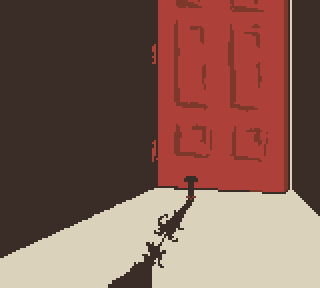Game Thoughts: Lorelei and the Laser Eyes
A few months back I was hearing a lot of praise for
Lorelei and the Laser Eyes; I finally grabbed it and
finished it in a couple sittings.
The game's basically a long, artsy, self-aware escape room with some
psychological/horror elements. It was pretty damn good!
In fact, it may be the best "virtual escape room"-type game I've ever
played. While a few puzzles fell into the "way-too-obvious" or "I would have
never figured this out without a guide" categories, the vast majority were
in the sweet spot (for me). Even the optional book of puzzles to open
shortcuts in the game (which amounts to 20ish pages of pure number / pattern
puzzles) was super fun. The few horror elements were tense, but never over
the top.
The overarching mystery of "what the fuck is going on" was also satisfying
to slowly piece together -- while it felt a little too avantgarde
at the beginning (which is on purpose and part of the theme) everything
clicked together by the end of the game.
Unfortunately the game really sucks at UI. For some reason someone decided
to make this a game where you just have directional input, the menu button,
and a single action button. No back button. This seems fine on
paper until you're manipulating hundreds of documents and interactive
puzzles with no "back" button, quick-restart, or "jump to next page"
controls. You will need to manually navigate to the close icon literally
hundreds of times throughout a playthrough, which adds nothing to the
experience but frustration.
That's the only stain on an otherwise great experience, however,
and you do kind of get used to it after a few hours.
It's definitely a must play for escape room and puzzle game fans!
Game Thoughts: Animal Well
As a hobbyist game developer (theoretically, anyways) I have been warned
many times "don't idolize one-person indie developers". Most one-person
indie titles never make it, and realistically any indie title that
does make it ultimately has a production team, a QA team, and all
kinds of other people that make "one-person" less true.
I can't help myself, however. There's something about games crafted
painstakingly by a single mind that just makes the ones that float to the
top special. Early Minecraft, Stardew Valley, Undertale, Cave
Story, Iconoclasts -- these are games that execute a vision and
they do it so well I can't help but idolize. If not the creators themselves,
then the process and the drive.
Animal Well is one such game, created by Billy Basso.
Eventually picked up by Bigmode Games which brought it into the spotlight,
the game presents an eerie metroidvania world full of puzzles, charming
graphics, and horror vibes.
I absolutely loved my time with this game. The bosses were wild, exploration
was a blast, and every puzzle was fun. The game elicits a kind of joy I've
only experienced playing one-person games. It's full of
weirdness that would have been voted out in a team-built game.
Everything's connected and lovingly thought out, everything feels
coherent. It's like getting to know somebody without ever meeting
them.
The game has several "layers" to it, and despite loving the title I tapped
out after layer 1 -- beating the final boss and rolling credits. You can
continue on to find all the collectibles in the game to unlock more, which
usually isn't my cup of tea. I did shoot for getting all the eggs but
decided to tap out at 50-something, as I was starting to rely on guides and
having less fun.
Does this title belong on the shelf with Undertale and Stardew Valley? I
don't think it has the same impact as its peers, each of which generated
massive fanbases and countless clones -- yet I'd happily categorize this as
another one-person masterpiece and proudly shelf it with the others.
Book Thoughts: Piranessi
Looking for something a little more fantastical to read after
Slaughterhouse-Five, I reached for Piranesi by Susanna
Clarke. I read "Johnathan Strange and Mr. Norell 1000 years ago, and while I
couldn't tell you a single thing that happens in that book I remember it
fondly.
Spoilers after the jump
- Read the rest -
Book Thoughts: Slaughterhouse-Five
Occasionally I actually get around to reading some literature (I
mean to do this more, but I can't stay away from my darling scifi/fantasy).
After my last read I got my hands on a copy of the Ethan Hawke-narrated
version of Slaughterhouse-Five.
This is a novel you can't really criticize; not only because it's globally
recognized as a fantastic piece of literature, not only because anything
there is to say about it has probably already been said, but because it's
weird, and due to it's level of unorthodoxy it carves for itself a
special untouchable place wherein any flaw could easily be intentional.
It was a thoughtful and thought-provoking slow burn and I thoroughly enjoyed
it. I am glad that I didn't read it earlier, as I only recently
binge-listened to a couple of WWII history podcasts. Knowing more about the
gritty details of the war helped color in the edges of this loose collection
of time fragments, and definitely resulted in a more fulfilling experience.
Book Thoughts: Embassytown
Some authors you just can't vibe with, no matter how on-brand their subjects
are. For me one of these authors appears to be China Miéville, the writer of
such famous works as Perdido Street Station and The City & The City.
I've previously tried to read Perdido Street Station and fell off halfway,
the strangeness of the setting never quite settling in my head. Perhaps it's
due to my weak mind's eye, or perhaps it's just their writing style, but of
the two books I've attempted, both felt as if I was only skimming the loose
details of a much deeper world.
Embassytown is the second of their works that I've
attempted, and I nearly gave up a few hours into the audiobook version.
Everything felt slow and dreamy (in a boring way) despite the complete
alien-ness and wonderful creativity of the scifi setting. I ultimately
finished the book, and really did love all the ideas on display in the story
-- but the writing or the pacing or something kept me from getting
in deep, and I found myself avoiding the audiobook more than reaching for
it.
This is a scifi book about language, and it takes a very
interesting approach, giving us aliens that are incapable of understanding
human speech and communciation. The ways humanity works around this, and the
sheer curiosity around the ways these aliens comminicate and interact with
humans was fascinating in ways the story sadly only ever hints at.
I was left wanting to know more -- more about the strange alien lifeforms,
more about their language, more about the strange dreamed-up form of space
travel. More than anything I wanted to see more of the other alien
lifeforms hinted at that communicate in bizarre and creative ways. I almost
would have preferred a documentary format than the story and characters that
were presented, which were ultimately vapid and boring on such a vibrant and
curious backdrop.
Game Thoughts: Abandoned 09-2024
Despite my best efforts I've got yet another pile of unfinished games. Just
stuff that I didn't have the patience to get through or wasn't clicking with
me. For the sake of preventing future me from repeating my mistakes, here
are the reasons for putting them down:
(Sekiro, Mother3, Void Stranger)
- Read the rest -
Story: A King De-Phoned
The following is a short story / writing exercise I'm titling
A King De-Phoned. It's a fairly mundane tale of first-world
problems involving relatively privileged individuals and occasional
hyperbole. That said, this stuff actually happened and was pretty shitty.
- Read the rest -
Book Thoughts: The Saint of Bright Doors
Thrusting out blindly for my next read, I ended up settling on the most
recent Nebula winner: The Saint of Bright Doors. The
audiobook version is superbly narrated, and the whole experience
was a very fun departure from my normal fantasy/scifi reads.
The setting is a modern-tech alternate indo-inspired continent with very
different takes on magic. Where I frequently enjoy fantasy that provides
clear constraints on it's magic system, this book leans heavily into a more
mystic world of vague demons and inexplicable occurrences -- such as how any
door left closed too long in the City of Luriat will seal forever.
The author brought the city to life, painting an extremely vivid and
interesting world with which they tell the story of Fetter, a man with
strange powers trained from childhood to assassinate a spiritual leader.
Spoilers below.
- Read the rest -
Comic Thoughts: Tokyo Ghoul
With a little too much time on my hands I decided to finally give
Tokyo Ghoul (main series plus :re) a read. I remembered
enjoying the first season of anime 1000 years ago, but recall that the
second season didn't hold my attention at all -- but as they always say:
"the manga was better".
- Read the rest -
Comic Thoughts: Innocent
I just finished the last chapter of Innocent &
Innocent Rouge. I was craving some grown-up-oriented manga
and settled on this. It was certainly something.
- Read the rest -

